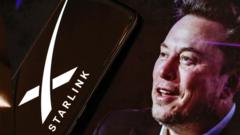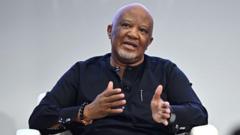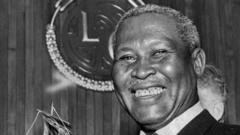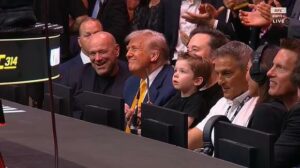The debate surrounding Starlink's inability to launch in South Africa has escalated, with Elon Musk accusing the country's black empowerment laws of discrimination. While South African authorities insist compliance is necessary, political resistance emerges, complicating potential resolutions.
Musk's Contentious Starlink Standoff with South Africa: A Clash Over Empowerment Laws

Musk's Contentious Starlink Standoff with South Africa: A Clash Over Empowerment Laws
Tensions between Elon Musk's Starlink and South Africa intensify as issues of racial equality and licensing requirements dominate the narrative.
In a heated back-and-forth that has garnered international attention, the clash between Elon Musk’s satellite internet company, Starlink, and South African authorities centers around the nation’s black empowerment legislation. Musk, whose social media following exceeds 219 million, claims his venture is barred from operating due to his race, stating that "Starlink can't get a license to operate in South Africa simply because I'm not black". However, the Independent Communications Authority of South Africa (Icasa) indicates that Starlink has never filed for the necessary operating license.
The South African government remains open to foreign investment, declaring that businesses like Starlink can start operations if they adhere to local laws. These laws stipulate that a minimum 30% ownership stake must be held by historically marginalized groups, primarily the black population who were systematically excluded during apartheid.
Since the end of apartheid in 1994, legislation to bolster black empowerment has been a foundational element of economic policy. Musk, born in South Africa before relocating to Canada and later the US, sees these requirements as obstacles for Starlink to penetrate the South African market. Notably, Icasa has reported that previous assertion from Starlink indicates that empowerment laws have effectively barred many foreign operators from entering.
Challenges to this notion have emerged, particularly from South Africa's communications minister, Solly Malatsi, who is aligned with the opposition party, the Democratic Alliance (DA). Malatsi has described the current empowerment requirements as potentially fostering cronyism and corruption, revealing intentions to seek a route around the ownership stipulation. He hinted at issuing a policy direction to facilitate Starlink’s entry without a mandatory black partner, as long as investments benefit local communities.
However, six months have passed without progress, as political pushback from ANC members persists, reinforcing firm commitments to the empowerment legislation. Khusela Diko, chair of the parliamentary communications committee, has made it clear that concessions to international business will not be considered, citing the law's strict compliance requirements.
The diplomatic landscape has deteriorated further, exacerbated by Musk's inflammatory remarks about South African policies and President Donald Trump’s threats to boycott the upcoming G20 summit hosted in South Africa. Claims of land expropriation without compensation have intensified, leading to a toxic environment for investment discussions.
While Musk's relationship with South Africa’s leadership once seemed promising, recent events indicate a shift toward aligning himself with right-wing factions within the country. Meanwhile, Starlink is making moves across Africa, having secured agreements in nations like Lesotho and Somalia, while navigating local compliance challenges.
Starlink is actively pursuing operations in Namibia, where regulatory hurdles and local ownership requirements pose yet another challenge. With growing expectations for high-speed internet access in under-connected regions, an impasse with South Africa could hinder progress.
In his bid to mend US-South African relations, President Cyril Ramaphosa appointed a special envoy to the US, hoping to ease tensions. However, criticism surfaces from various political factions concerning past comments made about Trump, underscoring the complex political dynamics at play.
As Starlink inches closer to launching in other African states, the conflict between Musk and South Africa is emblematic of broader global conversations about race, policy, and economic engagement in a post-apartheid context. The unique circumstances surrounding Starlink's operations point to a critical need for dialogue and compromise as both parties grapple with the realities of modern investment and historical legacies.


















